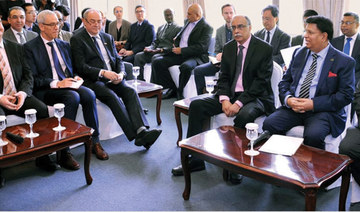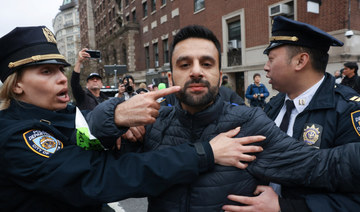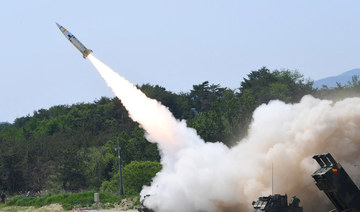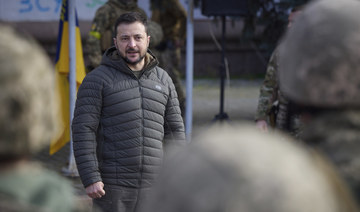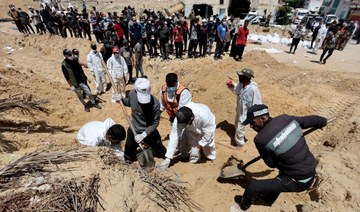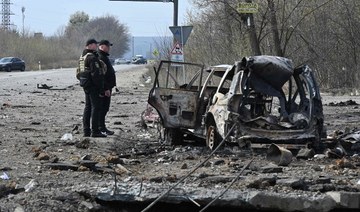UNITED NATIONS: An independent review of United Nations operations in the years before hundreds of thousands of Rohingya Muslims fled a violent crackdown by Myanmar’s military concluded that the organization’s many bodies failed to act together, resulting in “systemic and structural failures.”
The 36-page review by Gert Rosenthal, Guatemala’s former foreign minister, released Monday said the UN could conceivably have reconciled competing views on whether quiet diplomacy or outspoken advocacy against human rights abuses in Myanmar should have been used — but it didn’t.
The result — as in Sri Lanka at the end of the civil war against Tamil separatists in 2009 — was a “dysfunctional performance of the UN system,” Rosenthal said.
“Without question serious errors were committed and opportunities were lost in the UN system following a fragmented strategy rather than a common plan of action,” he said, adding that the “systemic failure was further magnified by some bureaucratic and unseemly infighting.”
The long-simmering crisis exploded in August 2017 when Myanmar’s military launched what it called a clearance campaign in northern Rakhine State in response to an attack by a Rohingya insurgent group. The campaign forced more than 720,000 Rohingya to flee to neighboring Bangladesh and led to accusations that security forces committed mass rapes, killings and burned thousands of homes.
Rosenthal said the key lesson is “to foster an environment encouraging different entities of the UN system to work together.”
On a more optimistic note, he said since UN Secretary-General Antonio Guterres took office at the start of 2017, “there appears to be renewed recognition of the crucial importance of improved coordination.”
UN spokesman Stephane Dujarric said Guterres, who commissioned the report, has accepted all of its recommendations “and is committed to implementing them.”
“The secretary-general is very grateful to Mr. Rosenthal for producing a candid, forthright and very useful report,” he said.
The review covers the UN involvement in Myanmar since 2010, when the at the time military-fueled nation moved started opening up to the outside world, eventually leading to elections and moves toward a more open, market-oriented economy.
Rosenthal said “for all these positive tendencies with their ups and downs over time,” Myanmar also engaged in “long-festering discriminatory treatment against minorities” for decades, most especially the Rohingya.
Buddhist-majority Myanmar has long considered the Rohingya to be “Bengalis” from Bangladesh even though their families have lived in the country for generations. Nearly all have been denied citizenship since 1982, effectively rendering them stateless, and they are also denied freedom of movement and other basic rights.
In his conclusions and recommendations, Rosenthal said Myanmar’s government is mainly responsible for the grave abuses against the Rohingya.
He said the UN system “has been relatively impotent to effectively work with the authorities of Myanmar to reverse the negative trends in the area of human rights and consolidate the positive trends in other areas.”
He also noted “increasing criticism regarding the lack of leadership displayed by Aung San Suu Kyi,” the government’s de facto leader, “as well as her unwillingness to take distance from the military.”
Although the UN’s systematic failures are not down to any single entity or any individuals, Rosenthal said, “clearly there is a shared responsibility on the part of all parties involved in not having been able to accompany the government’s political process with constructive actions, while at the same time conveying more forcefully the United Nations’ principled concerns regarding grave human rights violations.”
Rosenthal said the UN Security Council as the world body’s most powerful organization should also bear some responsibility because its divisions failed to provide support to the UN Secretariat “when such backing was and continues to be essential.”
The Secretariat “would have benefited enormously” from Security Council support for an impartial UN observer presence in Rakhine state “to deter the use of violence in general,” he said.
He said the UN, which has multiple ways to engage its 193 member states, could find ways “to criticize and prod governments that engage in serious violations of international law while at the same time cooperating with them in delivering humanitarian and development assistance.”
“This would be the highly desirable objective to address the obvious dysfunctional performance of the UN system observed in both Sri Lanka and Myanmar,” he said.
But Rosenthal said “recent experience, precisely in both countries, has gone in the opposite direction, with mindsets and specific actions” competing rather than complementing each other.
Louis Charbonneau, UN director at Human Rights Watch, said the United Nations failed to keep its promise of “never again” to mass atrocities after the wartime deaths of tens of thousands of civilians in Sri Lanka.
“If the UN leadership is determined to change its internal culture, it needs to hold UN officials most responsible for ignoring ethnic cleansing in Myanmar accountable for their inaction,” he said.
UN failed before Rohingya crackdown in Myanmar: Expert
UN failed before Rohingya crackdown in Myanmar: Expert
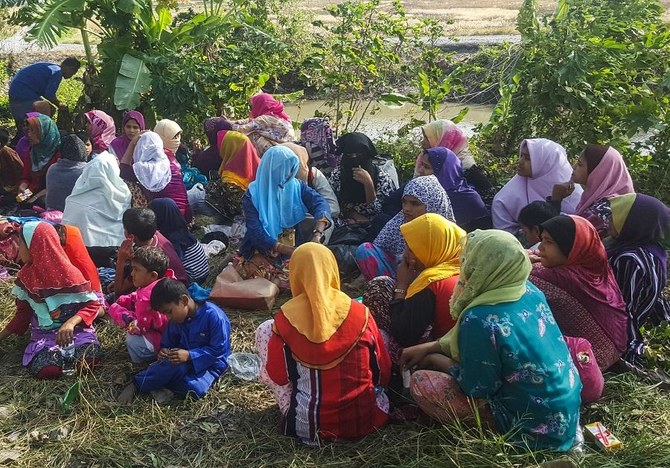
- An expert said said the UN could conceivably have reconciled competing views on whether quiet diplomacy or outspoken advocacy against human rights abuses in Myanmar should have been used, but it didn't
- The result was a “dysfunctional performance of the UN system”
‘Uncommitted’ organizers will join campus protesters in Michigan over Gaza

- Student protests in the US over the war in Gaza have intensified and expanded over the past week
- Democrats have become increasingly uneasy over the US support for Israel as the death toll and destruction climb in Gaza
WASHINGTON: Organizers behind the “uncommitted” political movement against President Joe Biden’s staunch support for Israel’s war against Hamas will travel to the University of Michigan’s campus on Thursday to join students protesting the war.
Student protests in the US over the war in Gaza have intensified and expanded over the past week after police first arrested students at Columbia, with so-called Gaza solidarity encampments established at colleges, including Yale, and New York University. Police have been called in to several campuses to arrest hundreds of student demonstrators.
Uncommitted organizers will travel to the University of Michigan’s Ann Arbor campus, they told Reuters, bringing together a political movement that’s disrupted Biden events and amassed hundreds of thousands of votes in Democratic primaries and a student movement that’s drawn students and faculty of various backgrounds.
Biden won Michigan by less than a 3 percent margin in 2020.
Democrats have become increasingly uneasy over the US support for Israel as the death toll and destruction climb in Gaza. A growing revolt inside the Democratic base signifies the challenge Biden faces in bringing together the coalition he needs to defeat Republican frontrunner and former President Donald Trump.
“President Biden is choosing to put his hands over his ears and ignore the hundreds of thousands of people who have already come out against the war at the ballot box,” said Abbas Alawieh, a prominent “Uncommitted” organizer, who is going to Ann Arbor with Layla Elabed, another Michigan organizer.
“Signing into law more money for Israel is sending a clear message to uncommitted voters, young voters that he doesn’t care to engage seriously with our demands to end this war,” he said, referring to the $26 billion in new aid Biden recently approved.
Alawieh said the uncommitted movement has not been coordinating with student groups so far. “We have an electoral focus, but we certainly see the demands of student protesters, who are calling for peace,” he said.
On campuses where protests have broken out, students have issued calls for a permanent ceasefire in Gaza, an end to US military assistance for Israel, university divestment from arms suppliers and other companies profiting from the war, and amnesty for students and faculty members who have been disciplined or fired for protesting.
Biden told reporters on Monday that he condemned both “antisemitic protests” and “those who don’t understand what’s going on with the Palestinians.” Biden campaign spokeswoman Lauren Hitt has said the president “shares the goal for an end to the violence and a just, lasting peace in the Middle East. He’s working tirelessly to that end.”
Trump called the campus protest situation “a mess” as he walked into his criminal trial in New York.
The uncommitted movement amassed sizable vote totals in Michigan, Minnesota and Hawaii primaries and had won 25 delegates as of the beginning of April. They are preparing to target the Democratic National Convention in Chicago in August, where Biden is expected to be nominated.
Polls show Biden and Trump running neck-and-neck ahead of their Nov. 5 election rematch nationally. Biden’s 2020 victory was due to narrow wins in key swing states like Michigan.
US nudges Germany on long-range missiles for Ukraine

- Washington confirmed the day before that it had sent Ukraine a variant of the ATACMS missile with a range of 300 kilometers
- “In terms of Taurus... this is a decision for Germany,” a senior US defense official told journalists
WASHINGTON: The United States hopes decisions by it and allied countries to send long-range missiles to Ukraine may encourage similar action by Germany, which has so far refused to provide its Taurus missiles, a US official said Thursday.
Washington confirmed the day before that it had sent Ukraine a variant of the ATACMS missile with a range of 300 kilometers (190 miles), while France and Britain have respectively supplied SCALP and Storm Shadow missiles, both of which have a range of about 250 kilometers.
“In terms of Taurus... this is a decision for Germany,” a senior US defense official told journalists when asked if the provision of long-range ATACMS could clear the way for Taurus missiles to be sent to Kyiv.
“But certainly the US provision of ATACMS as well as prior decisions by the UK and France to provide long-range cruise missiles, we would certainly hope that this would be a factor,” the official said, speaking on condition of anonymity.
Kyiv has long pushed for Germany to provide it with Taurus missiles — which can reach targets up to 500 kilometers away — to help its fight against invading Russian forces.
But Berlin has declined to send the missiles, fearing that it would lead to an escalation of the more-than-two-year-old conflict.
Moroccan man guilty of murdering man in UK in revenge for Gaza
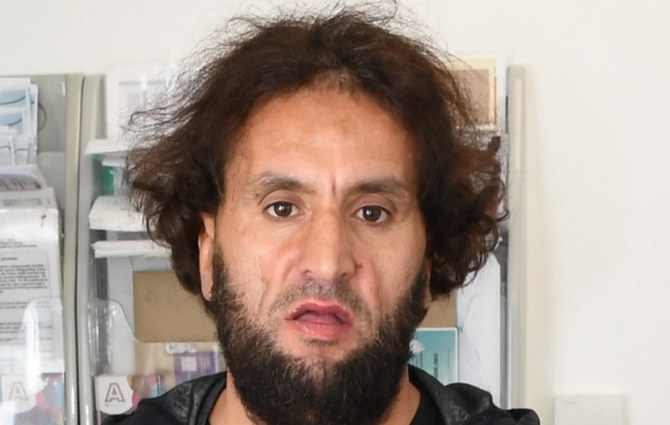
- Ahmed Alid killed his 70-year-old victim after approaching him from behind
- After his arrest, he told detectives he had committed the acts because of the conflict in Gaza, and in revenge for Israel killing innocent children
LONDON: A Moroccan man who stabbed to death a passer-by in the street in northeast England in what he later told police was revenge for Israeli action in Gaza was found guilty of murder on Thursday.
Ahmed Alid, 45, who had sought asylum in Britain, killed his 70-year-old victim after approaching him from behind on a road in Hartlepool the early hours of Oct. 15 last year, having previously attacked his housemate with two knives, prosecutors said.
After his arrest, he told detectives he had committed the acts because of the conflict in Gaza, and in revenge for Israel killing innocent children, blaming Britain for creating Israel, Britain’s Crown Prosecution Service (CPS) said.
Alid said if he had had a machine gun, and more weapons, he would have killed more people.
“By his own admission, Ahmed Alid would have killed more people on that day if he had been able to,” Nick Price, Head of the CPS Special Crime and Counter Terrorism Division, said in a statement.
“Whatever his views were on the conflict in Gaza, this was a man who chose to attack two innocent people with a knife, and the consequences were devastating.”
Alid had first used two knives to attack his sleeping housemate, to whom he had become aggressive after learning of his conversion to Christianity, stabbing him six times while shouting “Allahu Akbar,” or “god is greatest,” the CPS said.
The 32-year-old housemate, one of five asylum seekers who shared the property, managed to fight him off and another occupant came to his aid. Alid left the house with one of the knives and walked toward the center of Hartlepool.
He passed Terence Carney on the opposite side of the road before circling back and attacking him from behind, stabbing him six times in the chest, abdomen and back. Carney died shortly after police arrived.
Following his interview with police, he attacked the two female detectives, with one suffering injuries to her shoulder and wrist.
He was found guilty at Teeside Crown Court of murder, attempted murder and two counts of assaulting an emergency worker. He will be sentenced on May 17, when the judge will decide if his actions were related to terrorism.
India dismisses US human rights report as ‘deeply biased’
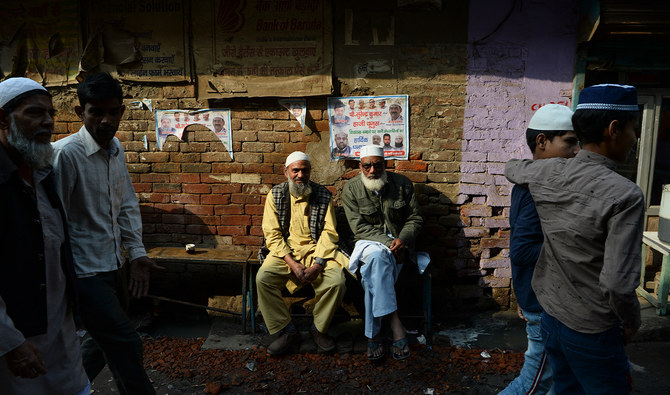
- Report found “significant” abuses in India’s Manipur state and attacks on minorities, dissenters
- India’s foreign ministry spokesperson says New Delhi does not attach any “value” to the report
NEW DELHI: New Delhi said on Thursday it does not attach any value to a US State Department report critical of human rights in India, and called it deeply biased.
The annual human rights assessment released earlier this week found “significant” abuses in India’s northeastern Manipur state last year and attacks on minorities, journalists and dissenting voices in the rest of the country.
Asked about it, Indian foreign ministry spokesperson Randhir Jasiwal told journalists on Thursday that the report “as per our understanding, is deeply biased and reflects a very poor understanding of India.”
“We attach no value to it and urge you to also do the same,” Jaiswal said.
Responding to a question about the growing protests on US university campuses against Israel’s offensive in Gaza that has killed more than 33,000 people, Jaiswal said that “there has to be the right balance between freedom of expression, sense of responsibility and public safety and order.”
He added that “democracies in particular should display this understanding in regard to other fellow democracies, after all we are all judged by what we do at home and not what we say abroad.”
While India and the US have a tight partnership, and Washington wants New Delhi to be a strategic counterweight to China, the relationship has encountered some minor bumps recently.
In March New Delhi dismissed US concerns over the implementation of a contentious Indian citizenship law, calling them “misplaced” and “unwarranted,” and objected to a US State Department official’s remarks over the arrest of a key opposition leader.
Last year Washington accused Indian agents of being involved in a failed assassination plot against a Sikh separatist leader in the US, and warned New Delhi about it.
India has said it has launched an investigation into Washington’s accusations but there has not been any update about the investigation’s status or findings.
Sweden to send NATO troops to Latvia next year: PM
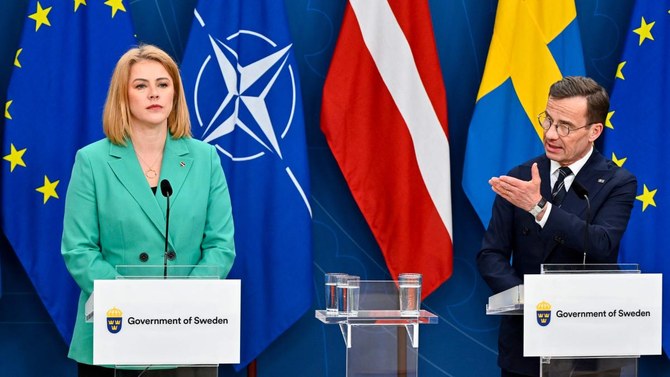
- The Swedish troop contribution was the first to be announced since the Scandinavian country joined NATO in March
- The battalion would be comprised of around 400 to 500 troops
STOCKHOLM: Sweden will next year contribute a reduced battalion to NATO forces in Latvia to help support the Baltic state following Russia’s invasion of Ukraine, Prime Minister Ulf Kristersson said Thursday.
The Swedish troop contribution was the first to be announced since the Scandinavian country joined NATO in March.
Kristersson had in January announced that Sweden would likely send a battalion to take part in NATO’s permanent multinational mission in Latvia, dubbed the Enhanced Forward Presence, aimed at boosting defense capacity in the region.
“The government this morning gave Sweden’s armed forces the formal task of planning and preparing for the Swedish contribution of a reduced mechanized battalion to NATO’s forward land forces in Latvia,” Kristersson told reporters during a press conference with his Latvian counterpart Evika Silina.
He said the battalion, which will be in Latvia for six months, would be comprised of around 400 to 500 troops.
“Our aim is a force contribution, including CV 90s armored vehicles and Leopard 2 main battle tanks.”
“We’re planning for the deployment early next year after a parliament decision,” he said.




